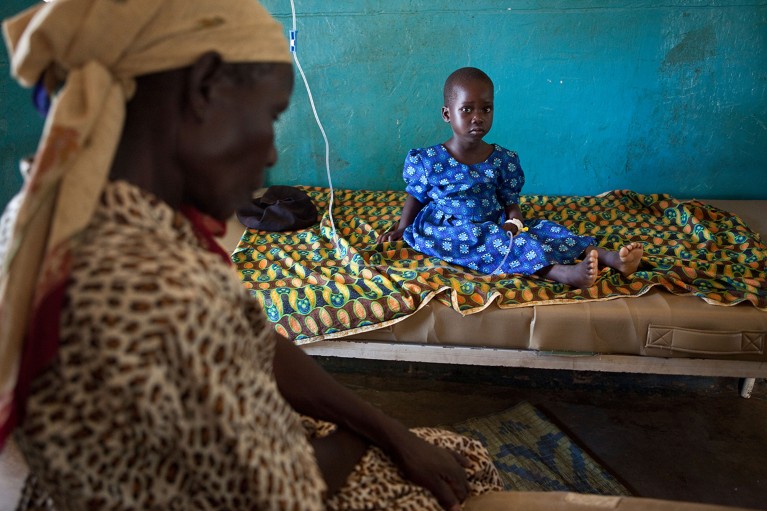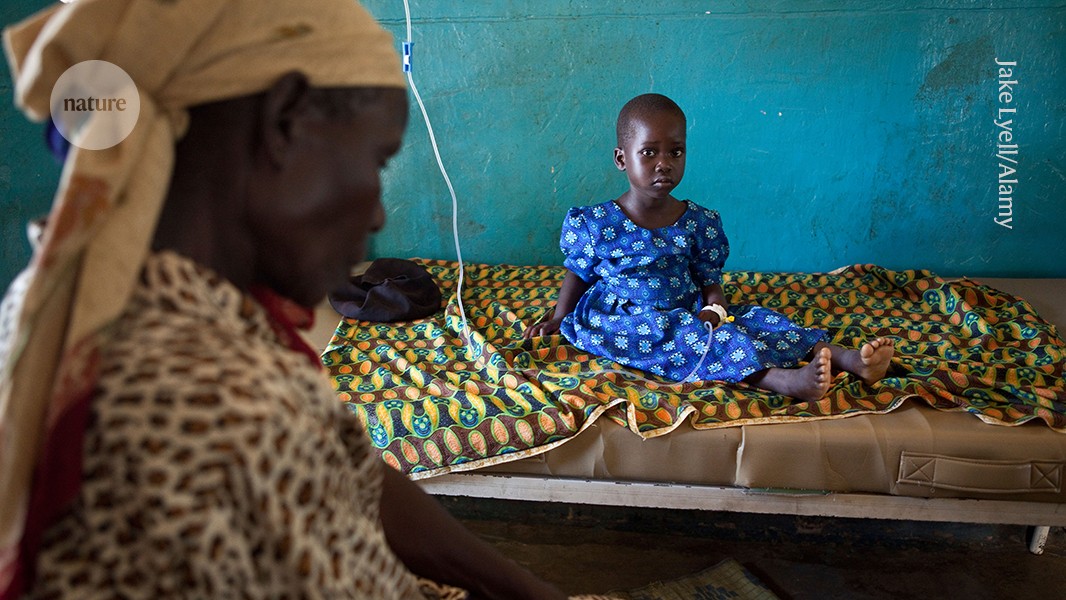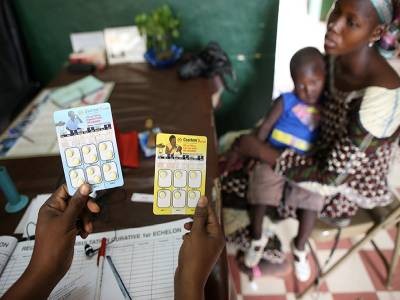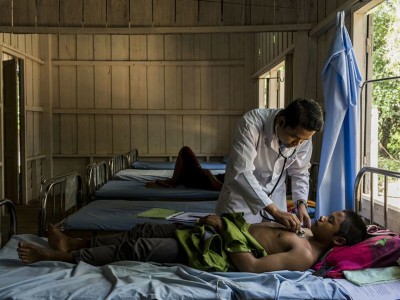
A child in Amuria, Uganda, is treated for malaria.Credit: Jake Lyell/Alamy
Scientists have detected resistance to artemisinin, a key malaria drug, for the first time among children in Africa with severe disease. The continent accounts for 95% of all deaths from malaria globally, and children are the most badly affected.
Resistance to front-line malaria drugs confirmed in Africa
“If this is verified by other studies, it could change guidelines for treatment of severe malaria in African children, and they are the biggest target group by far,” says Chandy John, a specialist in paediatric infectious diseases at Indiana University in Indianapolis. John is a co-author of the study, published in JAMA1 and presented today at the Annual Meeting of the American Society of Tropical Medicine and Hygiene, in New Orleans, Louisiana.
Artemisinin resistance has been detected in children in Africa previously, but the fact that it has now been identified specifically in children with severe malaria raises the threat level. The parasite that causes malaria, Plasmodium falciparum, is contracted through the bite of a mosquito. For treating ‘uncomplicated’, or non-severe, cases of malaria, the World Health Organization recommends a course of pills containing an artemisinin derivative, which rapidly eliminates most malaria parasites in the body, combined with a ‘partner’ drug that circulates in the body for longer and kills the remaining parasites. These regimens are called artemisinin-based combination therapies (ACTs).
For severe malaria, which can involve symptoms such as convulsions, breathing problems and abnormal bleeding, treatment is more intensive. Physicians administer intravenous artesunate — a fast-acting version of artemisinin — for at least 24 hours. This is followed by a course of ACT. Treating severe malaria rapidly is crucial for recovery, researchers say.
Tough to treat
The latest study, in Jinja, Uganda, looked at children aged 6 months to 12 years with severe malaria. The researchers found that 11 of the 100 participants, or about 10%, showed partial artemisinin resistance. This term refers to a delay in the clearance of the malaria parasite from the body after treatment; a partially resistant infection is classified as one in which the drug takes longer than 5 hours to kill half of the malaria parasites.
How to defuse malaria’s ticking time bomb
In the past, researchers have connected specific mutations in P. falciparum proteins with the emergence of partial artemisinin resistance2 — meaning that the parasites are evolving to evade the ‘gold standard’ malaria treatment. John and colleagues analysed the genomes of the parasites infecting children in their study, and found that ten participants had one of two types of these mutations. One of the mutations, detected in eight participants, was associated with artemisinin taking longer than usual to clear the parasite.
Another group of ten children in the study had a malaria infection that recurred after their treatment concluded. These cases were not attributable to the presence of any known artemisinin-resistance mutations. Instead, John thinks the recurrence might have been caused by resistance to lumefantrine, a partner drug administered orally in the ACT step of the treatment regimen for severe malaria. But more studies are needed to evaluate that possibility, John says. “What the recurrence suggests to us is that maybe that partner drug is not working as well as it should, because the parasites are coming back,” he adds.
Since resistance to artemisinin was first identified in southeast Asia in the 2000s, scientists’ biggest concern has been how it will affect the treatment of severe cases of malaria, says Philip Rosenthal, a malaria specialist at the University of California, San Francisco. “Even if the drug still works, that slower action could make a difference and lead to higher levels of mortality,” he says.
But the study by John and his colleagues doesn’t provide a definitive answer to whether artemisinin resistance is already leading to worse clinical outcomes, Rosenthal notes. The study size was too small, and all the children analysed eventually recovered, even if this process sometimes took longer than expected. That just shows that current treatments for severe malaria aren’t “quite as good as we might have hoped”, he says.
Rosenthal and others are still worried about this news, however. “The emergence of artemisinin partial resistance in Africa is a major threat to malaria control,” he says. “We are now only starting to understand what’s going on.”




